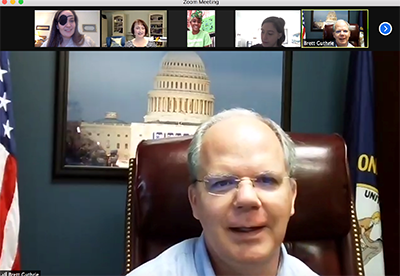Rare Disease Week is almost here, and Rare Disease patients, caregivers, and advocates of all kind are shining a light on the needs of the rare disease community!
The Orphan Drug Act of 1983 defines a rare disease as one that affects fewer than 200,000 people in the United States. Foremost, it is important to recognize that rare diseases are not actually all that rare. The NIH estimates that one in 10 – or about 30 million – Americans live with one of over 7,000 known rare diseases, including myasthenia gravis.
During Rare Disease Week, hundreds of advocates will travel to Washington, D.C. to meet with their Senators and Representatives to discuss how policy affects their lives. There are tons of events that can be attended virtually, as well.
Monday 2/27
FDA will host Rare Disease Day, a virtual public meeting, on Feb. 27, 2023, 9 a.m. – 4:45 p.m. ET, in global observance of Rare Disease Week. This year’s theme is “Intersections with Rare Diseases – a patient focused event.” Participants will have the unique opportunity to:
- Hear directly from the FDA on initiatives to advance medical product development for rare diseases.
- Engage with the FDA to provide your perspectives as a patient, caregiver, or family member.
- Understand considerations and challenges associated with clinical trials in small populations.
- Hear from medical students on rare disease education for medical professionals.
Tuesday 2/28

The author (far left) and other advocates meet with Congressman Brett Guthrie, who represents Kentucky’s second district.
Rare Disease Day at NIH will be held at NIH Main Campus (Natcher Conference Center) on Tuesday, Feb. 28, 2023, from 9 a.m. to 5 p.m. ET. There will be a virtual livestream via NIH VideoCast, with the event archived for replay afterward. The event agenda features panel discussions, rare diseases stories, exhibitors, and scientific posters. The event is free and open to the public.
The goals of Rare Disease Day at NIH are to:
- Demonstrate NIH commitment to helping people with rare diseases through research.
- Highlight NIH-supported research and the development of diagnostics and treatments.
- Initiate a mutually beneficial dialogue among the rare disease community.
- Exchange the latest information with stakeholders to advance research and therapeutic efforts.
- Shine a spotlight on stories told by people living with a rare disease, their families, and their communities.
- Bring together a broad audience including patients, patient advocates, caregivers, health care providers, researchers, trainees, students, industry representatives, and government staff.
Wednesday 3/1 and Thursday 3/2
On Wednesday, March 1 and Thursday, March 2, the Everylife Foundation for Rare Disease and Rare Disease Legislative Advocates will host the Legislative Conference, a day of meetings and speaking events to learn more about advocacy, the legislative process, and current policies that affect the rare disease community. Then, on Thursday, the Rare Disease Congressional Caucus meets before advocates split up to meet directly with the offices of their representatives in the Senate and House of Representatives.
A Congressional caucus is a group of members of the United States Congress that meets to pursue common legislative objectives – in this case, rare diseases. The Rare Disease Congressional Caucus is a bicameral, bipartisan organization. You can check to see if your members of Congress are involved and, if not, send them an email asking them to join!
When advocates meet with their representatives, they typically have a short window to make their voices heard. Typically, this means a 30 to 60-second “pitch” or “elevator speech” in which you give your story, explaining the disease and how it has affected your life. Then, advocates make an “ask,” or request for specific legislative actions that can be taken to help in terms of policy.
How will you be participating in Rare Disease Week advocacy this year? Email the MGFA and let us know.

